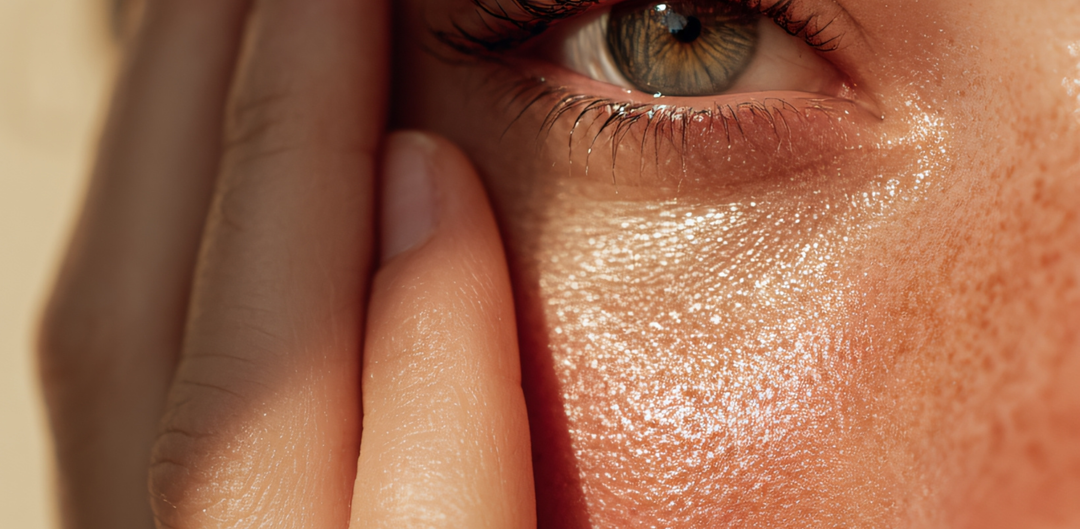In today’s fast-paced world, stress seems almost unavoidable, and while we often focus on how stress affects our mental and physical health, it’s important to remember that stress can also impact our skin. The culprit behind this is cortisol, often referred to as the “stress hormone.”
Cortisol is a hormone released by the adrenal glands in response to stress. When we experience stress, our cortisol levels rise, which can have various effects on the body—including the skin. While cortisol plays an essential role in our fight-or-flight response, chronically elevated cortisol levels can wreak havoc on our complexion.
How Does Cortisol Affect Your Skin?
-
Increased Oil Production
Cortisol stimulates the sebaceous glands to produce more oil. Excess oil can lead to clogged pores, contributing to breakouts, blackheads, and acne flare-ups. This is particularly frustrating for those with acne-prone skin, as stress can exacerbate existing skin conditions. -
Collagen Breakdown
Collagen is a protein that keeps our skin firm, smooth, and youthful. Unfortunately, elevated cortisol levels can break down collagen and elastin in the skin, leading to premature aging. This can manifest as fine lines, wrinkles, and a loss of skin elasticity. -
Inflammation
Cortisol can trigger an inflammatory response in the body, which can result in flare-ups of skin conditions like eczema, rosacea, and psoriasis. Chronic inflammation can also lead to redness, irritation, and a dull complexion. -
Impaired Skin Barrier
Cortisol can weaken the skin’s natural barrier, making it more susceptible to external aggressors such as pollution, UV rays, and environmental toxins. A compromised skin barrier can result in dehydration, increased sensitivity, and slower healing of the skin.
Tips for Managing Cortisol Levels and Keeping Skin Healthy
While stress is a natural part of life, there are ways to manage it and minimise its impact on your skin. Here are some tips to help you keep your cortisol levels in check and promote a healthy, glowing complexion:
-
Practice Mindfulness and Relaxation Techniques
Incorporating mindfulness practices like meditation, yoga, or deep breathing exercises can significantly reduce stress levels and, in turn, lower cortisol. Taking even just a few minutes a day to practice mindfulness can help calm the mind and body, which will reflect positively on your skin. -
Prioritise Sleep
Poor sleep can raise cortisol levels, leading to skin issues such as dark circles, puffiness, and lackluster complexion. Aim for 7-9 hours of quality sleep each night to allow your skin to repair and regenerate. Creating a calming nighttime routine, such as using a soothing skincare regimen or aromatherapy, can also promote better sleep. We love a simple skincare routine, but an absolute essential is our Restoring Good Night Crème which has a fabulous light lavender scent that can help you drift right off! For a little extra boost, you could try using a facial roller (like a rose quartz or jade one) to help disperse product onto your skin as well as giving yourself a gentle facial massage which is both calming and helpful for lymphatic drainage. -
Adopt a Balanced Diet
What you eat can influence your cortisol levels. Incorporate foods rich in antioxidants, healthy fats, and vitamins—such as leafy greens, berries, nuts, and avocados—into your diet to help combat inflammation and support skin health. Additionally, reducing your intake of processed foods, sugar, and caffeine can help regulate cortisol levels. -
Get Moving
Regular physical activity is a great way to manage stress and lower cortisol. Exercise increases endorphins—our body’s natural mood boosters—while also improving circulation, which helps nourish the skin. Aim for activities that bring you joy, whether it’s yoga, walking, or a high-intensity workout. -
Focus on a Gentle Skincare Routine
Since stress can weaken the skin’s barrier, it’s important to use gentle, nourishing skincare products that help restore and protect your skin. Look for ingredients like hyaluronic acid and natural botanicals to keep your skin hydrated and strengthen its natural defences. Avoid harsh exfoliants or overusing active ingredients that can further irritate stressed skin. A great starter pack is the Essential Six Bundle which has everything you need to create a gentle and effective morning and night ritual. -
Establish Boundaries and Take Breaks
Sometimes, managing stress means setting boundaries in both your personal and professional life. Take time to disconnect from work, social media, or other stressors when you need it. Doing so can lower your cortisol and allow your body and skin time to recover. Something that you could start with is to try putting your phone down before bed and doing some reading rather than scrolling prior to sleep. Not only will the quick digital detox be helpful for your mental state, the break from blue light is great as it can act is a stimulant (something that can keep you up).
Let's Sum it All Up!
Stress and elevated cortisol levels can take a toll on your skin, leading to breakouts, premature ageing, and inflammation. By taking proactive steps to manage stress and nourish your skin from the inside out, you can help mitigate these effects and maintain a radiant, healthy complexion. Remember, glowing skin starts with self-care, and managing your stress is key to keeping your cortisol—and your skin—in check.
Incorporate these stress-relieving practices into your routine, and your skin and your mental state will thank you!





